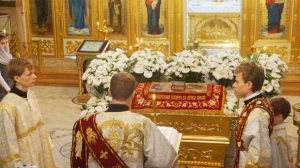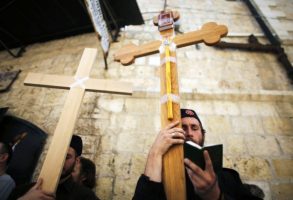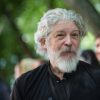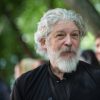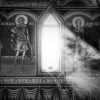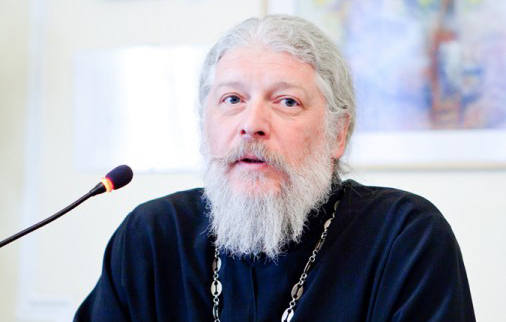
Archpriest Alexei Umisky
In the Name of the Father, and of the Son, and of the Holy Spirit!
The present day is that of the Mystical Supper, which the Lord celebrated before His suffering and at which He instituted the Mystery of the Communion of His Body and Blood. We commune of Christ’s Holy Mysteries on Sundays: this Mystery is the center of our Christian life, the center of our fellowship with Jesus Christ. This is paramount for someone who believes in God and is a member of Christ’s Church. We indeed aspire towards this Mystery and it is indeed very important for us to be with Christ and to commune of His Body and Life-Giving Blood.
Today’s Liturgy is essentially no different than any other Divine Liturgy, because the same Mystery takes place and the same words are spoken during every Divine Liturgy. The same Body and Blood are offered to the faithful.
Nonetheless, the present day is a special one for the Church, because today the meaning of our journey to Christ, the meaning of our encounter with Him, the meaning of our fellowship with Him is experienced more than ever. Today’s Gospel reading opens up this Mystery of the Church to us, this Mystery of our life and of the meaning of our faith in general. When Christ comes to His disciples, He removes His outer clothing, takes a basin with water and, approaching each disciple, begins to wash his feet. He washes the feet of each, including the betrayer, who will be unfaithful to Him. He washes their feet with love, meekness, and humility. In reply to the bewilderment of the disciples about why He is doing this, and to Peter’s words – dost Thou wash my feet? (John 13:6) – Christ says: I am doing this so that you, too, would do this. This is the meaning of our encounter. This is the meaning of our fellowship.
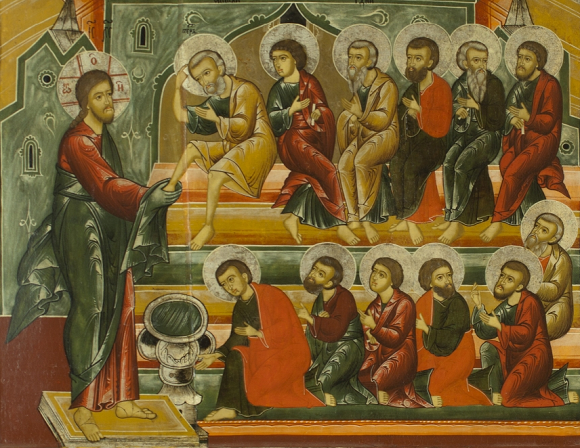 Let us recall the Gospel and give thought to what the Lord commands us to do. Let us recall and be amazed, because in the Gospel the Lord does not in fact command us to do much of anything. For example, nowhere does He command His disciples to fast. The Pharisees ask why His disciples do not fast, to which He replies: they cannot fast while the Bridegroom is with them. He does not give any particular prayer rule. They themselves approached Him first to ask: Lord, teach us how to pray. He gave them a very short prayer and nothing more.
Let us recall the Gospel and give thought to what the Lord commands us to do. Let us recall and be amazed, because in the Gospel the Lord does not in fact command us to do much of anything. For example, nowhere does He command His disciples to fast. The Pharisees ask why His disciples do not fast, to which He replies: they cannot fast while the Bridegroom is with them. He does not give any particular prayer rule. They themselves approached Him first to ask: Lord, teach us how to pray. He gave them a very short prayer and nothing more.
Much of what we think of as being the Lord’s commandments was not in fact commanded by Him. He did not impose any heavy burdens and did not say: do this, don’t do that. We find nothing in the Gospel apart from what was already there in the Law of Moses. The Ten Commandments that had been given to humanity remained in place. The Lord said that not one iota would be added to the Ten Commandments. There was just one thing that He repeated constantly – many, many times to His disciples – in the Gospel: whoever wants to be the chief among you, whoever wants to be the first, let him be the servant of all. The Lord repeats these words to us persistently: the first shall be last, and the last shall be first.
When He was completing His earthly journey, He washed the feet of His disciples in order to get across to us the most important thing in the Gospel. The Lord thereby showed us once again why He had come to earth and what we should do to please God. Was it to fast, to fulfill certain prayer rules, to perform acts of charity, or to do something else that might add something external to us? No, not at all. The Lord said nothing of the sort. He never gave any special instructions regarding philanthropy, fasts, or prayers. These had already been given. They are already present in every religion. They are naturally human. Without this someone is just not human, if he ignores beggars or the grieving and does not help them. This is not what makes him a new and different person. This is not what will lead him into the Heavenly Kingdom.
The Lord constantly repeated just one thing: be the servant of all. Later He also said: I give you a new commandment, that you love one another. Love one another with the same love with which I love you, with the same love with which My Heavenly Father loves Me. Not with any love beside this: not with human, fleshly love, but with Divine, Ineffable, and Unutterable love. This Divine love is manifest in the Lord humbling Himself before people to the point of suffering on the Cross. To the point that, for our sake, He comes to earth, takes on human nature in all its fullness, with all its sinful repercussions and human infirmities, and enters the depths of every person’s suffering. He does not reject any sinner, but comes to them first. He says: I came to earth for their sake, for the sake of publicans, sinners, and harlots. He eats with them and drinks with them. He spends more time with them than with anyone else. This is something we also need to picture. It is unpleasant for us to be around dishonorable and unclean people; we want to dissociate ourselves from them. This is something naturally human, a naturally human fear of touching something infected. But Christ was with them above all, in order to save man. And He began to serve them. He began to pour Himself out completely for their sake – for their sake, and for ours, because we are no different from them.
The Lord offers us this image. This is not just an example, as if the Lord, just for the sake of setting an example, removed His garments and showed us what to do, as we sometimes teach children using an example we ourselves would never follow. The Lord washes His disciples’ feet because He always does this, because this is something He does constantly. This is the way in which He treats us. When we have only just come into church, when we are only just getting ready to approach Him, He immediately begins to wash our feet.
Sometimes we think that just by coming to church we are accomplish some remarkable feat. How wonderful we are! How much are we doing for God by coming to church, going to confession, writing commemoration sheets! But we do not understand that by coming to church we are entering that same upper room where the Lord gathered His disciples and washed their feet. We do not think about the fact that when we come to church He begins to do just this for us, because when we go to confession, He begins to serve us and to wash not only our feet, but our hands and head as well, because we are defiled. He washes us all in confession. We come to God in order to ask His help, but He immediately begins to serve us and to fulfill even our petty desires and our empty, mundane, human demands that are of no spiritual benefit to us.
This is what is opened up to us today. Today we do not simply approach Christ and accept His sacrifice for us. Today we approach Christ to offer our own sacrifice, so that He would accept it, so that we would be at least a little bit worthy, so that the Lord would accept our sacrifice. This is the sacrifice of love and humility, and nothing else. Because nothing else leads us into the Heavenly Kingdom except for this desire to see another person in the light of His love: to forget his shortcomings, his distortedness, his sinful twistedness, and to see in him Christ Himself, Who came into the world and made Himself your neighbor, as the Gospel teaches us.
Without this no Christianity will take place. Without this there is no Church of God, because the Church of God is the continual service of love for God and one another. And there can be no other Christian Church without this happening.
If this love is not in us, then we can observe the fasts, read the Gospel, pray a great deal, and give everything we own to the poor. The Apostle Paul writes that even if I give my body to be burned, but do not have this love in me, that it has no value or meaning [cf. 1 Corinthians 13:3]. Therefore it is natural that the Lord would expect this love from us. Divine love is born only through humility. If we understand that this love is not in us, that we would like to love but cannot, this means that we lack the most elementary thing: humility. In order to gain this love, we need to act as the Lord teaches us: to see your master in your neighbor. St. Symeon the New Theologian said: whoever has seen his brother has seen his God.
This will be the most important foundation of our faith, of our journey to Christ. When we receive His Holy Body and Blood today, let us ask that, as we leave church, we may see the world through different eyes, the eyes through which the saints saw our world: whoever has seen his brother has seen his God. Amen.
Delivered in the Church of the Life-Giving Trinity in Khokhly (Moscow), 2005













